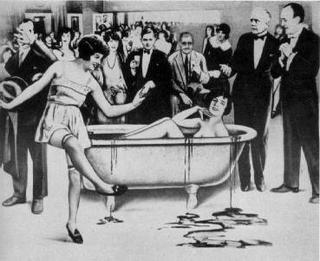Texas Guinan portrayed by actress Gladys George

The Roaring Twenties (1939) is action director Raoul Walsh's first gangster film (and first film for Warner Bros.).... This newsreel-like, semi-documentary, authentic-looking film, with both hard-hitting gangster genre action and romantic sentiment, shares a lot of similarities and is reminiscent of the greatest gangster films of the 30s, including Little Caesar (1930), Scarface: The Shame of the Nation (1932), and Public Enemy (1931). All of these films portray bootlegging, numerous murders, gangster life, and the death of the hero at the conclusion.
. . . At the end of the thirties, Walsh's 'social history' film eulogizes and recreates the entire Jazz Age decade, Prohibition, and its repeal (including the process of manufacturing bathtub gin), and the Depression era (through the mid-1930s) with an expansive, eulogistic perspective within an historical framework.
. . . The screenplay for the film [written by Jerry Wald, Richard Macaulay, and Robert Rossen] was based on an original screen story by Mark Hellinger. Hellinger's prohibition saga, originally entitled The World Moves On, was based on his experiences as a New York newsman during the Roaring 20s, and his familiarity with the illegal clubs of the day (i.e., the Hotsy-Totsy, Dizzy, and Blackbottom). This last of the gangster films in the 30s, with James Cagney in the thinly-disguised (and humanized) lead role, was based upon the real-life rise and fall of New York mobster-racketeer Larry Fay who had a business relationship with his brassy, frowsy saloon singer-promoter and hostess Texas Guinan (actress Gladys George's role as Panama Smith). [Texas Guinan was famous for her shout-out to patrons - "Hello, suckers" - which was changed to a less abrasive greeting "Hello, chumps" in the film.]
. . . This superb film was not nominated for a single Academy Award. During the opening scrolling prologue after the credits, Mark Hellinger (in a voice-over) apologetically informs the audience that the film ("a memory") is based upon facts, real people, and true events that he covered as a reporter during the 1920s - - when Prohibition, speakeasies, and gangster life pervaded the land:
. . . Mark Hellinger says: "It may come to pass that, at some distant date, we will be confronted with another period similar to the one depicted in this photoplay. If that happens, I pray that the events, as dramatized here, will be remembered. In this film, the characters are composites of people I knew, and the situations are those that actually occurred. Bitter or sweet, most memories become precious as the years move on. This film is a memory - - and I am grateful for it." . . .
- - excerpt from "The Roaring Twenties" on http://www.filmsite.org - -
Texas Guinan
http://TexasGuinan.blogspot.com/atom.xml
Texas Guinan.



<< Home